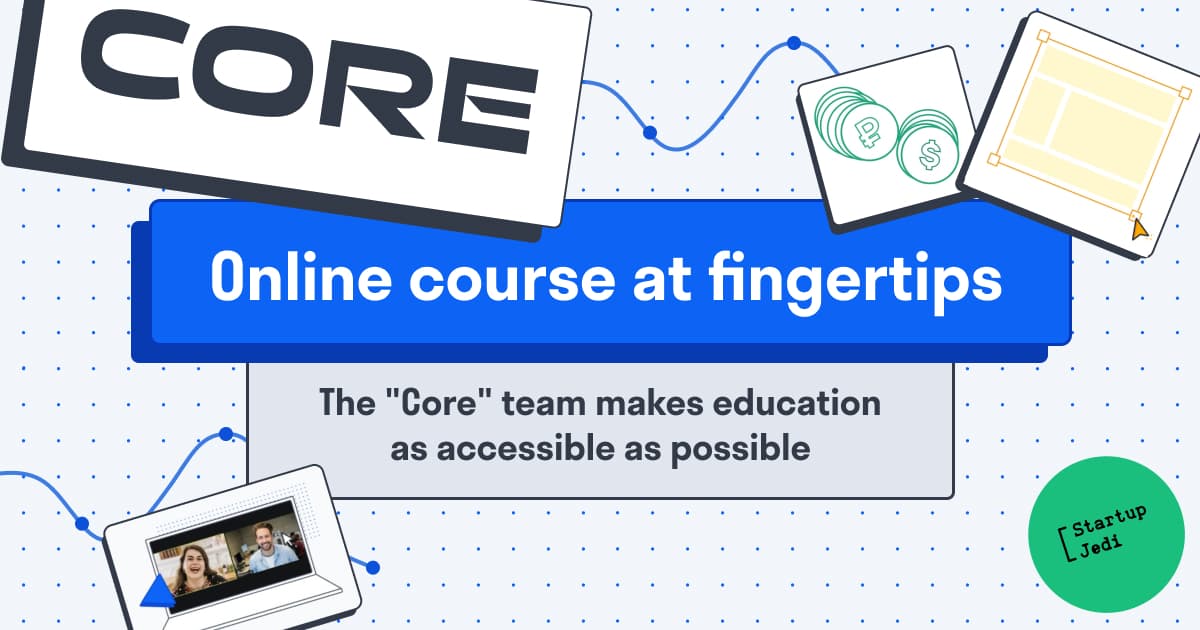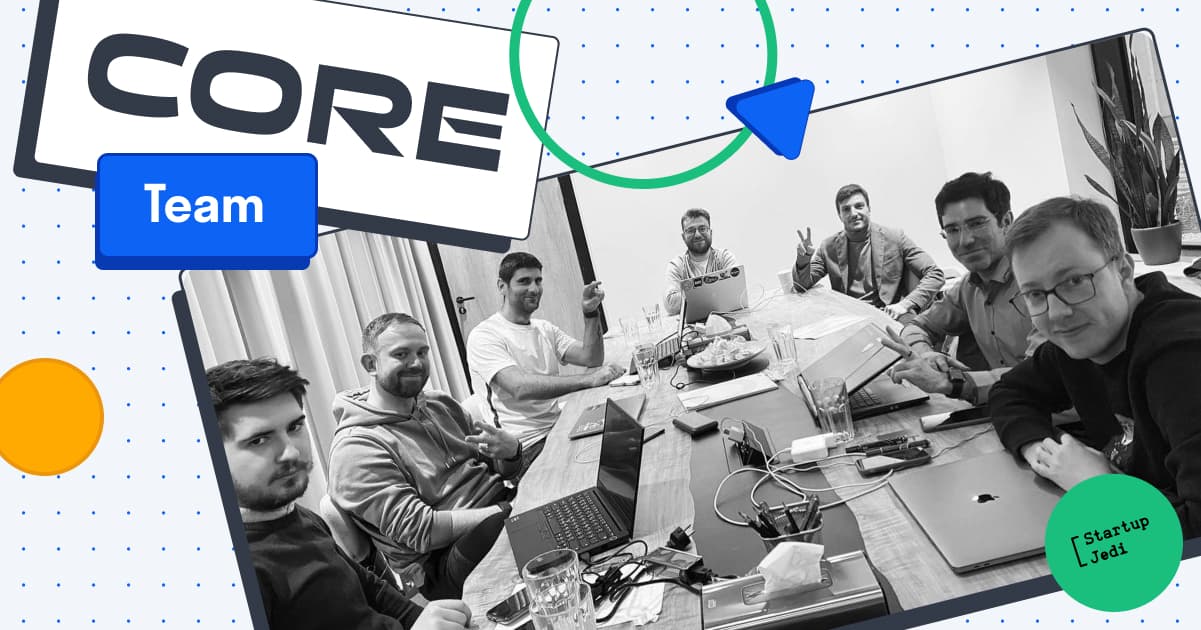
Startup Jedi
We talk to startups and investors, you get the value.
Education is facing an explosive digitalization. Hundreds of platforms offer the opportunity to launch your online course, but only a few actually work with millions of students and receive a lot of thanks from teachers. Educational platform CORE managed to reach this level in Russia and now is preparing to capture new markets. CEO CORE, Anton Sazhin, has shared with us what clients pay more for creating online courses, in what sense online education in Russia is better than in the United States, and how the company plans to enter the American market.

Startup Jedi
We talk to startups and investors, you get the value.
CORE is a platform for launching online courses. You can create a lesson on our platform easily, pretty much like with Tilda. Just drag and drop blocks to the right places, fill them with content and publish — everything is intuitive and accessible. We also worked on optimization for mobile devices: you don’t even need a desktop to create an online lesson. About 75% of users access the platform from smartphones.
The platform has a huge selection of blocks for a variety of methodological tasks: texts, photos and videos, quests, mini-games, intensives, interactive simulators, and much more, allowing you to put together an original and engaging course. Integrations with Zoom, payment systems and chatbot platforms are also available, so the student does not need to be redirected anywhere, all they need is on one page.
CORE has a subscription model. Our monthly cost of servicing one course on the platform starts at ₽990 ($12.8), and most customers choose the plan for ₽4 990 ($65).
There are dozens of tools around the world for creating online courses, from completely free to very expensive. We have two advantages over them: CORE is very easy to use and intuitive. And we are also the only ones who give the opportunity to collect and launch individual lessons for free — this is especially important for those who are just entering online education.
Also, none of our competitors offer a solution that allows you to manage and control the user base — after all, customers have to keep data on platform servers, while the user base is the main asset of any online school. It is relatively easy to transfer content to another platform, but convincing all users to re-register elsewhere is much more difficult.
Today, more than a million people study on our platform and about 50 000 teachers create content for them. We have already passed the break-even point and are steadily increasing profits.
...

4M students came to the CORE education platform during the lockdown in April-May 2020. School teachers still write letters to developers thanking them for saving their educational process. When the state systems of distance education, one by one, refused to work with such a big number of students, while teachers had to conduct lessons, they were caught between two fires. CORE allowed them to move their classes online quickly, easily, and for free.
We have a unique opportunity for the market to create separate online lessons for free, and students can take them without registration. We only charge money when you launch a course, that is, a set of related lessons. Thanks to such a low entry threshold, we have grown tremendously in the number of users in the spring of last year without spending a penny on marketing.
Together with The Agency for Strategic Initiatives, we launched several social projects in the field of education, thanks to which teachers found out about us, and then recommended us to others.
The rapid growth in the number of users showed that we thought out the architecture well. CORE worked without failures, we just had to quickly buy hard drives due to lack of space for such a volume of data.
However, we do not plan to develop the direction of school education in the Russian-speaking market as we won’t be able to monetize success in this field. We found three other niches for ourselves where we can grow and earn.
...

We have been actively developing the b2c direction since October 2020. We work with professionals and new online schools that want to launch their first educational products online. It is important for them to enter online education easily and at minimal cost and not to be stuck with complicated settings and development.
About a hundred such clients come to us every month. We are actively increasing this number and plan to reach +1000 schools a month in the coming months. So far, all clients have been Russian-speaking, but there are several projects with schools from Britain and Croatia, which found us through recommendations.
For the larger course producers, we have a dedicated product: the online academy. With our help, you can create your own independent training platform to keep everything under control. The integration solution gives the client the ability to control and manage content, personal accounts of students, connect their domain, third-party services, and brand the interface. It takes from 14 days to implement such projects.
Now we are launching an online academy for a new project by Maxim Spiridonov, ex-CEO of Netologiya-Group. He will have the opportunity to quickly build a large online business school and not depend on us — in his mega-project, we are just a technical partner.
Another important segment of clients is universities. They want to compete with major players in the online services market and successfully sell their continuing professional education courses there, not just offline in classrooms. It is also important for state universities to be able to send documents on the completion of their courses by students to the unified register of additional education — this is a legal requirement of the Russian Federation.
We enabled this option and immediately saw the interest of universities: now we are working on a project with the Far Eastern Federal University and help them quickly and easily enter the online education market.
...

Our strategy now is to finalize the product in Russia and move to new markets. In the home market, we test hypotheses for working with small clients since they will be our main users in other countries. When we implement all the functionality necessary for such users on the platform and increase the metrics, we will enter the markets of the USA and Latin America. The requests from users in Russia and America are similar, so our developments at home will be relevant there as well.
Surprisingly, Russia is ahead of the United States in many ways in terms of the quality of online education. Our “info-gypsy” with its “aggressiveness” and “lack of integrity” has brought the attraction of students to perfection, and the quality of the packaging of information products is one of the best in the world. Sales funnels are well-developed, automated and work very efficiently — most of the Russian experience can be taken and used in the American market since there’s still a lot they do not know about.
We are also preparing the legal part of the product. Education is very sensitive to data storage and quality of service, and there are many regulations in this area that need to be complied with. It takes a long time to work with this.
We plan to finalize the product in Russia and work out all the legislative restrictions in a year. And, most likely, we will enter different countries in the region in turn.
The USA, of course, is a priority for us. Our prices make us very competitive on the American market. CORE costs $15 per month, and our closest competitor Kajabi charges $200 and offers far fewer educational opportunities. If we confirm our marketing hypotheses in the US market, then there will be no reason not to go.
We were also contacted by partners from Indonesia, so we are considering this market as well. In general, we choose the markets we want to enter based on legal restrictions and the presence of a good partner.
...

I was very lucky with the team. We have been together for 20 years. I met my partner Artem Loginov and other members in 2001 when we were playing for one clan in Warcraft 3.
We began our joint work with the organization of an online furniture store — then we had to quickly master Yandex.Direct, SEO, organization of delivery, and so on. Then we launched a Web development studio, where we worked on many complex and large projects. After that, I became interested in online courses and launched a few courses on a variety of topics: from yoga to quantum physics, while working at the National Research Technological University “MISiS”.
So, by the time the startup was created, our team already had expertise in the development and diverse experience in education, including online. CORE appeared at the junction of these two disciplines.
Now 30 people are constantly working on CORE, we attract additional people when needed for individual projects. We are all motivated by the benefits that our work brings: when we read the thank-you letters from teachers and see the feedback from teaching experts, we understand that we are not living our lives in vain.
...

From the moment CORE was founded to the Seed-round, I developed it with my own funds. I invested about ₽10M. We raised the first round of investments already at the stage of scaling a successfully working strategy. Our investor is the company of Igor Rybakov and partners Prytek, that we have already collaborated with on educational projects. We understand each other well and have the same vision of the future.
Today CORE is part of Prytek Humantek Group. This is an Ed & HR-tech group that unites five companies: the HackerU cybersecurity school, the CyberLeninka platform, a startup for HR FriendWork, the Online Education Development Fund service and Core. In the long term, these projects can grow synergistically through the exchange of data and audience. In the meantime, Humantek Group supports projects with investments and competencies.
At the end of 2020, Humantek invested $1M in CORE in exchange for 51% of the company and plans to invest another $2M in the future. We will use these funds to develop the product and enter new markets. We will raise the next round after receiving the first results of international expansion.
...
The online area today accounts for 5% of the entire educational services market. And the prospects for growth by displacing traditional teaching in classrooms are enormous. However, the required number of professionals in this industry to meet the demand is not yet available. So I see today’s boom in online education as just the beginning.
Freelancers have become a huge growth driver for e-learning. Their number is growing all over the world because it is more profitable for employers to work with them. In 2020, one in two employable Americans earned this way. Freelancers do not have the opportunity to use corporate training programs, they need to take care of their professional development on their own — and therefore online training is their main assistant.
People aged 45+ are also helping to actively grow online education a lot. They want to become part of the knowledge economy, but they lack competencies. After all, the professions we are accustomed to, such as an accountant or a cashier, are gradually dying out, and the people employed in them want to continue working further — and for this, they need to acquire new skills. This trend is driving the growth of online education and the emergence of educational products specifically for this category of students.
The accelerator of online trends, of course, was the pandemic: people received a powerful “online vaccination” when they were forced to cross internal barriers and start using online tools. It turned out that thanks to them, many things can be done faster and easier now the “remote” no longer sounds scary.
I believe that online learning can take up to 20% of all educational services. The main drawbacks of online are retention and education of children. In addition to the educational process, schools and universities have helped parents control their children for centuries so that they do not misbehave under peer influence. While the children are at their desks, they are under supervision, the responsibility is on the teacher.
Therefore, the remaining 80% of the educational services market will be taken by hybrid formats. Digital tools will inevitably be used in the learning process even when students are still sitting in front of a teacher in the classroom — this is the only way to improve the effectiveness of the learning process. Therefore, digital services for education will be needed at every lesson. It is important that they are flexible and suitable for different use cases. And that’s exactly what we work on.
Facebook: facebook.com/StartupJedi/
Telegram: t.me/Startup_Jedi
Twitter: twitter.com/startup_jedi
Comments